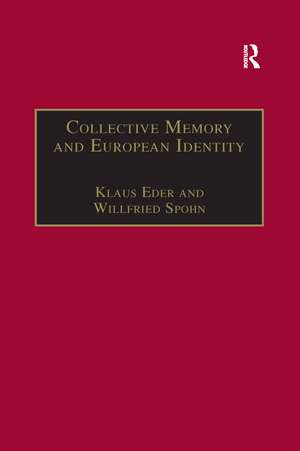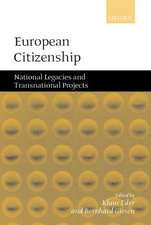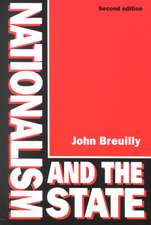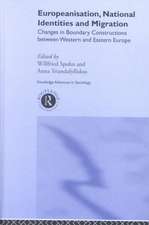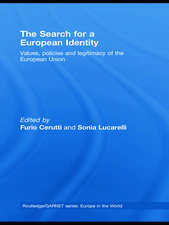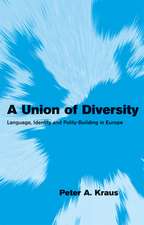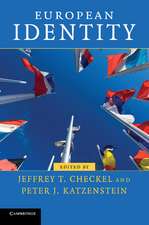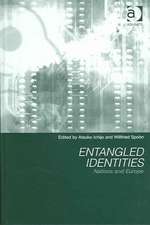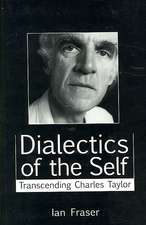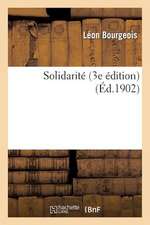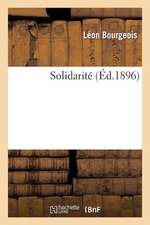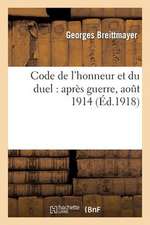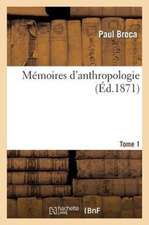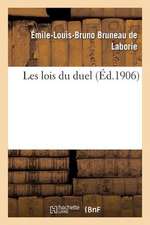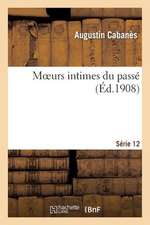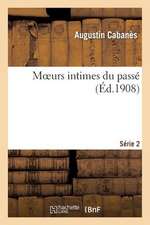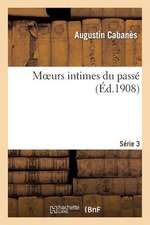Collective Memory and European Identity: The Effects of Integration and Enlargement
Autor Willfried Spohn Editat de Klaus Ederen Limba Engleză Paperback – 30 iun 2020
| Toate formatele și edițiile | Preț | Express |
|---|---|---|
| Paperback (1) | 384.86 lei 6-8 săpt. | |
| Taylor & Francis – 30 iun 2020 | 384.86 lei 6-8 săpt. | |
| Hardback (1) | 766.85 lei 6-8 săpt. | |
| Taylor & Francis – 28 mar 2005 | 766.85 lei 6-8 săpt. |
Preț: 384.86 lei
Nou
Puncte Express: 577
Preț estimativ în valută:
73.67€ • 80.04$ • 61.92£
73.67€ • 80.04$ • 61.92£
Carte tipărită la comandă
Livrare economică 21 aprilie-05 mai
Preluare comenzi: 021 569.72.76
Specificații
ISBN-13: 9780367604387
ISBN-10: 0367604388
Pagini: 240
Dimensiuni: 156 x 234 x 13 mm
Greutate: 0.34 kg
Ediția:1
Editura: Taylor & Francis
Colecția Routledge
Locul publicării:Oxford, United Kingdom
ISBN-10: 0367604388
Pagini: 240
Dimensiuni: 156 x 234 x 13 mm
Greutate: 0.34 kg
Ediția:1
Editura: Taylor & Francis
Colecția Routledge
Locul publicării:Oxford, United Kingdom
Cuprins
Contents: National identities and collective memory in an enlarged Europe, Willfried Spohn. Collective Identities in Europe and European Identities: European self-understanding in the Twentieth Century, Hartmut Kaelble; East-European historical bequest en route to an integrated Europe, Jerzy Jedlicki; Global diaspora? European Jewish consciousness? Reflections on German Jewry and the postmodern debate, Y. Michal Bodemann. Europe, National Identities and Collective Memory in Western Europe: Re-modelling the boundaries in the New Europe: historical memories and contemporary identities in German-Polish relations, Oliver Schmidtke; Italy, EU-enlargement and the ’reinvention’ of Europe: between historical memories and present representations, Ilaria Favretto; Spain’s ’Special Solidarity’ with the East: the influence of collective memory on Spanish attitudes to EU enlargement, Pablo Jáuregui. Europe, National Identities and Collective Memory in Eastern Europe: NATO and Hungarian public opinion, András Kovács: Troublesome anniversary: the rise of the Czechoslovak Republic and its European fellows in Czech collective memory, Karel KubiÅ¡; Converting history into ’cultural treasure’ in post-1991 Kaliningrad: social transitions and the meaning of the past, Olga Sezneva. The Argument Revisited: Remembering national memories together: the formation of a transnational identity in Europe, Klaus Eder; Index.
Notă biografică
Klaus Eder is Professor of Sociology at the Humboldt-Universität zu Berlin. His publications include: 'Die Entstehung staatlich organisierter Gesellschaften' (Suhrkamp 1976), 'Geschichte als Lernprozeß? (Suhrkamp 1985), 'Die Vergesellschaftung der Natur (Suhrkamp 1988), 'The New Politics of Class (Sage 1993), 'The Social Construction of Nature' (Sage 1996). He has co-edited (with Bernd Giesen) European Citizenship (OUP 2001) and (with Crouch/Tambini) Citizenship, Markets, and the State (OUP 2001) and (with Kousis) Environmental Politics in Southern Europe (Kluwer 2001). He has coauthored (with Giesen/Schmidtke/Tambini) Collective Identities in Action (Ashgate 2002). Willfried Spohn, PD Dr., is adjunct professor in sociology at FU Berlin and is currently director of an EU research project 'Representations of Europe and the Nation in current and prospective member states - elites, media and civil society' at the European University Viadrina, Frankfurt-Odra. His recent publications are (with Steven Hanson): Can Europe Work? Germany and the Reconstruction of Postcommunist Societies, Seattle 1995; 'History and the Social Sciences,' International Encyclopedia of the Social and Behaviorial Sciences, London 2001; (with Anna Triandafyllidou): Europeanization, National Identities and Migration, London 2002, and 'Multiple Modernity, Nationalism and Religion - A Global Perspective,' in: U. Schuerkens (ed.), Global Forces and Local Life-Worlds, 2003.
Descriere
In this volume, leading scholars assess the link between collective identity construction in Europe and the multiple memory discourses that intervene in this construction process. This timely work is the first to investigate collective identity construction on a pan-European scale and will be of interest to academics and postgraduate students of po
